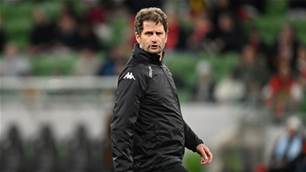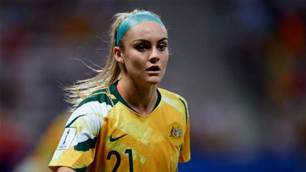SHE is referred to as Australia’s “matriarch of women’s football” and is the only woman in FFA’s Hall of Honour, but Elaine Watson OAM still can't bring herself to call it anything other than soccer.
“To me it’s soccer because I am comfortable with that term,” Watson explains. “Because I’m used to it, I prefer it.”
Watson’s preference for the now-dated terminology is a byproduct of a 40 year association with the game, commencing at a time when male footballers still struggled for mainstream credibility, and female football was administered as an after though as a part of the junior competitions.
Watson was instrumental in the founding of the South Queensland Women’s Soccer Association serving as President and Treasurer from 1976 to 1981. She was also elected President of Australian Women’s Soccer Association from 1978-89 and President of Oceania Women’s Soccer Federation from 1984 until 1993.
She has also written two books on the history of the women’s game in Australia – Australian Women’s Football: The First 20 Years and Women’s Soccer In Queensland: In A League Of Its Own.
Her list of personal honours is exhaustive but she cites the Order of Australia she received in 1993 and her place as the sole female in FFA’s Hall of Honour – the highest recognition offered by the governing body for services to the game – as being of particular personal value.
In 2010, Football Brisbane renamed the zone’s premier women’s trophy the Elaine Watson Cup in honour of her “many years of selfless service”.
Now 77, Watson hasn’t played a formal role in the game’s administration since she stepped down from the Football Queensland disciplinary committee in 2007 due to ill health; however, she still takes a keen interest in the women’s game from the stands.
“I enjoy the skills they display on the field but I have no knowledge of what goes on off the field anymore," she admits. "I’m just a spectator looking at the end results.
“But I am so impressed by the surge in it – women’s soccer and the W-League – and I find it hard to credit that I was there in the very beginning, before any of that."
Although she jokes: “Then I think to myself, maybe it wouldn’t have gone that well if I hadn’t of been there.”
Heather Reid, Chief Executive Officer of Capital Football and last season’s W-League champions Canberra United, describes Watson as a “true and valued friend” and openly credits the growth of the women’s game to Watson’s pioneering administrative work.
“She is the matriarch of women’s football in Australia because of her long-standing dedication and determination to see women and girls have equitable opportunities within a male dominated sport,” said Reid.
“Elaine was once described by a leading national football administrator as 'that woman' and I think this is because whenever he saw Elaine she would be pushing the women’s game and seeking better resourcing, support and backing for what she and many others were trying to achieve.
“Her legacy is that the solid foundations that she helped lay have been realised with the tremendous growth, expansion an acceptance of women within the game in Australia.”
One of these foundations was Watson’s role in the establishment of the Women’s National Soccer League in 1996 – the precursor to the current W-League.
“The W-League probably would’ve started sometime in the last five years but certainly Elaine’s contributions have provided the encouragement and reinforcement that such a league is necessary if Australian teams are going to be competitive on the world stage in the modern era,” Reid says.
Watson’s first active involvement in the sport came in the early 1970s in Mackay, when she responded to a need for more junior referees by becoming accredited – only later realising that in doing so she had become the first fully qualified female referee in Australia.
“They were always short of referees. So when they held a course, I sat and passed the exam,” Watson recalls.
As part of her role with the then fledgling South Queensland Women’s Soccer Association, Watson was the manager of the Queensland team for the first women’s national championships in 1974 held in Sydney.
“I had six weeks to choose the team and get the uniforms,” she says. “Funnily enough, after all that, we ended up the only team with a proper uniform at the championships.”
Watson also travelled with the Australian Women’s national team – not yet given the moniker of Matildas – first overseas tour to Taiwan in 1978 for what as known as World Invitational Tournament.
She explains that although the Matilda’s name is now well known and loved, it wasn’t the only option under consideration when they devised the nickname in the early 1980s.
“We looked for a name because the newspapers always dream up something if there is nothing there for them," she said
She reveals the team was very nearly dubbed called the ‘Soccertoos’ – “like a cockatoo but also because the boys were Socceroos and we always said that women played soccer too.
“But the girls always liked the name Matildas and it had that association with the olden days and they would sing ‘Who’ll come a waltzing matilda with me?’”
Despite the large number of female participants in the game and the continued interest in the W-League and Matildas, Watson feels the mainstream media coverage has not been forthcoming.
“In my mother’s era they had more newspapers articles about women’s sport than now," she says. "Now you’re lucky to get one every six months.
“We used to have women reporters reporting on women’s sport. They did basketball and tennis and, in our case, articles on soccer as well.
“Now it’s eight pages of footy, footy, footy and only the men seem to get the real coverage.”
Even to her last involvement in the game, Watson refused to give up the good fight, telling of a particularly fiery disciplinary hearing she chaired in 2003 that concerned an abusive parent.
“If that woman had a knife, I wouldn’t be here today,” Watson recalls.
“She swore at me and I rapped the table and asked her to leave the room. Well, all hell broke loose. She was throwing books and pushing tables over.
“Then she reached across the table, went wallop and knocked my glasses off."
Reid explains that Watson was never one to shirk from what need to be done: "She led by example and was never afraid to get stuck in or get her hands dirty when needed.
"She has a very forthright and determined style that is mixed with care and love for everything that she did for women and girls in football.
"If it had to be done, then Elaine would do it."
Related Articles

'Timing not right': Montemurro's verdict on Matildas vacancy

Matildas: 'Fourth at the Olympics is honestly the worst place you could come'
.jpg&h=172&w=306&c=1&s=1)












